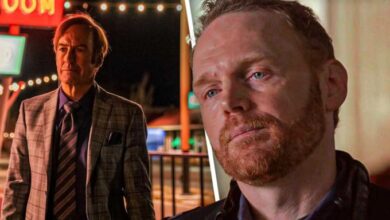‘Better Call Saul’ Wouldn’t Have Been The Same Without This Character
He left an impact that was always far-reaching and consequential.

Some characters are always destined to be doomed, and the power of hindsight suggests that Nacho in Better Call Saul may have been written with such heartbreaking intentions. From a passing mention in Breaking Bad to becoming one of the most endearing characters of its spin-off, Nacho’s journey has been the most beautiful in the show’s run. From a small-time criminal to becoming an insider in the Cartel, Nacho’s character arc was forced by compulsions of the situations Michael Mando’s character often found himself in. While his tragic death left the fans heartbroken in Episode 3 of Better Call Saul’s final season, his fate had a redeeming quality. Much like his life, he died on his own terms, however unpleasantly. Undoubtedly, Michael Mando’s Ignacio “Nacho” Varga was one of the best, if not the best, characters to blossom out of Better Call Saul.
Bob Odenkirk’s Jimmy McGill might feel a high level of relatability with Mando’s Nacho, as both characters seemed to have fallen for the lure of the crime life but did not find it easy enough to get out of it once they were introduced to the dark side. After being introduced as a minor antagonist to Jimmy McGill in Season 1, Nacho managed to quickly climb up in the hierarchy, partly due to circumstances of his own making by the final season. But Nacho’s every move further ensured that his ties with the cartel were being further tightened, to the point that leaving his crime-driven life was no longer a feasible choice.
Nacho Transformed Himself Throughout ‘Better Call Saul’

Similar to how Nacho forced Jimmy to dupe the Kettlemans in Season 1, Episode 2, “Mijo” by suggesting that Jimmy was now “in the game” and did not have the option to decide whether he wanted to be a part of Nacho’s plan, Nacho rarely found himself in a situation in which he had a choice, although he tried to have one whenever possible. But he struggled, ever since Gustavo “Gus” Fring (Giancarlo Esposito) forced him to be part of his schemes to dethrone the Salamancas from Albuquerque. Having realized that his actions have brought danger to the doorsteps of his father (Juan Carlos Cantu), whom he dearly loved, Nacho knew that it was time for him to walk out of his relationship with the cartel as a free man. His actions in Season 5 were directed towards his efforts to achieve the same until the plan to kill Lalo Salamanca (Tony Dalton) was goofed up by the mercenaries working for Fring.
Nacho’s troublesome relationship with his father defined much of his actions in the latter seasons. While initially working for the cartel, Nacho showed signs of a ruthless criminal who could have become a promising don had he continued his alliance with Lalo Salamanca. A cunning and enterprising crook who could work his way out of the toughest of situations, as evidenced by the way he managed to remove Hector Salamanca (Mark Margolis) from his path to eliminate the threat to his father, Nacho displayed the lengths to which he could go to defend what mattered to him. The positive change in Nacho’s character arc began taking place at the moment in time when his preference started shifting from the pursuit of power to the safety of all whom he held close.
Nacho’s character deeply reflected the fate of others both in the Breaking Bad and Better Call Saul universe who choose to opt for a life ridden with corrupt choices and morality. Much like Walter White (Bryan Cranston) and Jimmy McGill, the protagonists of the two worlds, Nacho Varga chose an ill-fated path, only to realize that it was easier to get in than to get out. Once Nacho decided to do away with his past choices, he started working towards ensuring that he could walk away without any collateral damage. Had Lalo Salamanca never shown up or had Gus Fring never discovered Nacho’s role in Hector’s fate, Nacho would have achieved what he set out to do. But through becoming a puppet in the hands of Fring, he ensured that he would have to wait around till Lalo Salamanca was completely out of the picture. However, it is questionable whether Fring would have allowed Nacho to walk away with information that could destroy the empire he was trying to build.
When tasked with ensuring Lala Salamanca was left vulnerable enough for Fring to hunt him down, Nacho succeeded in his mission quite brilliantly as he facilitated easy access to Salamanca in the season finale of Season 5. However, Lalo’s survival ensured that Nacho was a man fated to be hunted, for the rest of his time. But even in moments of desperation and fear, Nacho stood as a classic example of a Better Call Saul character by showing the complexity of his character. Nacho’s clear concern for the elderly in the Salamanca household in Season 6, Episode 1, “Wine and Roses,” during his conversation with Mike, reflected his internal turmoil as a son who did not want to stand in front of his father with the blood of innocents on his hands.
Nacho Varga Redeemed Himself Before His Death

Even before his ill-fated death, Nacho owned the few moments he was given to redeem himself as a character who had made many mistakes and was fated to own all of them by the end. His courageous encounter with the Salamanca Twins in Episode 2, “Carrot and Stick,” was a remarkable tribute to someone who had one last fight left in him. Nacho’s realization that he was never destined to survive Mexico became the deciding factor for him as he realized that he had no saviors and that he would be destined to live a life on the run, even if he managed to make it out alive. In the last bargain that he made with Gus and Mike for the safety of his father, Nacho shone as a son who was prepared to do what it took to set the record straight. It may not have been as ideal as going to the police like his father wanted, but Nacho’s decision to become the sacrificial lamb for Gus clarified that he had decided it was time to face the heat of his past choices and stop running from them. Still, he did it on his terms, prioritizing the safety of his father — something that motivated all of his recent choices.
Nacho’s final moments in Season 6 gave a deserving sendoff to a fan-favorite character — including his final drink with Mike to prepare for the injuries that he endured, his presentation in front of the Salamancas, and his decision to deviate from the decided plan and kill himself, robbing Hector Salamanca of the pleasure to kill the man responsible for his condition. The episode established Nacho Varga as a character that was flawed by all means but invaluable for his contributions to the story and the show.
The cold opening in Episode 3, which shows a blossomed blue flower in the desert, captures the essence of Nacho as a character that had truly blossomed by the end of his run in Better Call Saul. Not only did Nacho’s death change the course of events that subsequently affected Saul Goodman’s trajectory, but he was able to carve out his own identity as a character that was courageous and tenacious, yet vulnerable at the same time. Constantly marked by the dilemmas of a character forced to play his hand by the situations he’s faced with, Nacho Varga left an impact that was always far-reaching and consequential for the characters around him.


